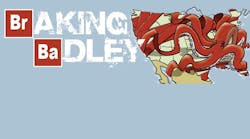In American history no U.S. president who’s served a full term has left office without presiding over at least one year that met or exceeded 3 percent real gross domestic product (RGDP) growth. President Obama may be the first. With one year left in his tenure as Commander-in-Chief, the U.S. has experienced a 1.55 percent annualized average of RGDP growth.
If the President’s enduring economic legacy is historically slow growth, one of the causes of this symptom may be overregulation. In his first six years in office, the Obama Administration issued nearly double the amount of major rules as the Bush Administration. According to the Competitive Enterprise Institute, under President Obama the Executive Branch has already issued over 24,000 regulations, which equals over a dozen new regulations each business day. Many of these new regulations are hundreds of pages long, and many days see 100-200 new regulations. These regulations cost the economy tens of billions of dollars each year and many only achieve questionable, ideological goals.
Franchise small business owners know one of the most ideological and threatening regulations is the National Labor Relations Board (NLRB) August 2015 creation of a joint-employer standard. Expanded joint employment liability threatens to make franchisors responsible for franchisee employment decisions they have nothing to do with.
In 1984, the NLRB clarified the federal labor law standard for evaluating whether one employer can be found jointly liable for another entity’s employees. Since then, the joint-employer standard has been based on whether one employer has direct and immediate control over another company’s employment practices, which may include wage-setting, scheduling, hiring and termination. The direct control joint-employer standard has protected franchise businesses by allowing franchisees to make their own employment decisions without undue involvement by franchisors.
In August 2015, the NLRB issued its highly anticipated decision in Browning-Ferris Industries (BFI) and created a new joint-employer standard. The question before the NLRB was whether BFI was a joint employer with a staffing services company Leadpoint of employees that worked at one of BFI’s facilities. The NLRB said the two companies were joint employers, based on BFI’s indirect and reserved but unexercised control of the Leadpoint employees. Because the NLRB ruled companies can be named as joint employers merely because they had the potential to control labor conditions is outrageous; it is akin to a driver being ticketed for speeding while her car sits in the garage, simply because she has the potential to speed in the future.
How will the new joint-employer standard impact franchise businesses throughout the country? It threatens the long-term viability of the franchise business model. Now franchisors may be held liable for the employment and labor actions of franchisees or third-party vendors, suppliers or staffing firms over which they have no direct control. Due to this new liability, franchisors may be compelled to exercise more control over small businesses with which they contract to limit their NLRA liability.
Consequently, franchisees may ultimately forfeit operational control of the stores they built. Enterprise value of thousands of franchises and small businesses may decrease because of the decreased operational control. Future franchise development is jeopardized as brands expand using a corporate ownership model.
While joint employer is an attempt to drive a wedge between franchisor-franchisee relationships, the International Franchise Association is galvanizing business and political leaders across the country to reverse the NLRB’s overreach.
While joint employer is a relatively new policy issue, the IFA and its members have worked overtime to educate lawmakers in Washington, DC, and state capitals around the country about the profound, long-term impact of joint employer on franchising. IFA is pressing congressional leaders again this year to enact a reversal of the NLRB’s joint employer decision. To help achieve that federal goal, the Coalition to Save Local Business (CSLB) is also pushing state legislatures to enact laws that make clear that franchising is dependent on franchisees being responsible for employees in a franchise system. IFA’s team, led by Dean Heyl and Jeff Hanscom, is making remarkable progress in several states.
Here is a state legislative update, as of press time, where elected leaders have been pushing back against joint employer:
· Tennessee – Law enacted
· Texas – Law enacted
· Louisiana – Law enacted
· Michigan – Law enacted
· Wisconsin – Bills (SB 422 & AB 578) have passed their houses of origin and are awaiting final passage to Gov. Scott Walker’s desk.
· Indiana – HB 1218 passed both the House and a Senate committee unanimously and is now awaiting consideration by the full Senate.
· Virginia – HB 18 passed the House and is awaiting Senate action.
· Georgia – SB 277 passed the Senate Insurance & Labor Committee and will be considered by the full Senate.
· Utah – HB 116 passed the House and was referred to the Senate Business & Labor Committee.
· Colorado – HB 1154 was introduced and was referred to local government committee.
While the state legislation listed above does not supersede the National Labor Relations Act and thus fully protect franchising, these efforts allow the CSLB and our allies to push congressional delegations to enact a more meaningful federal reversal of joint employer. Our message to Congress is, “Many state legislatures are protecting franchise small businesses. Now its your turn.”
